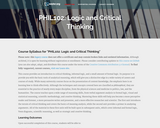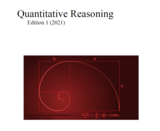
This course provides an introduction to critical thinking, informal logic, and a small amount of formal logic; its purpose is to provide students with the basic tools of analytical reasoning. Upon successful completion of this course, students will be able to: Understand what critical thinking is and why it is valuable; Distinguish between good and bad definitions, Recognize the differences between explicit and implicit meaning, and remove ambiguities of meaning from unclearly worded statements; Recognize arguments in writing, pick out good and bad arguments by their form, and construct sound arguments of their own; Diagnose the most common reasoning errors and fallacies, as well as identify ways of improving them; Understand the basics of sentential and predicate logic and gain practice manipulating meaning symbolically; Understand the rudiments of scientific methodology and reasoning; Evaluate arguments that rely on specific types of visual representation; Understand the basics of strategic reasoning and problem solving; Understand the particular challenges involved in reasoning about values and morality; Diagnose fallacies and evaluate arguments about values and morality. (Philosophy 102)
- Subject:
- Arts and Humanities
- Philosophy
- Material Type:
- Assessment
- Full Course
- Homework/Assignment
- Lecture
- Reading
- Syllabus
- Provider:
- The Saylor Foundation
- Date Added:
- 06/14/2019
